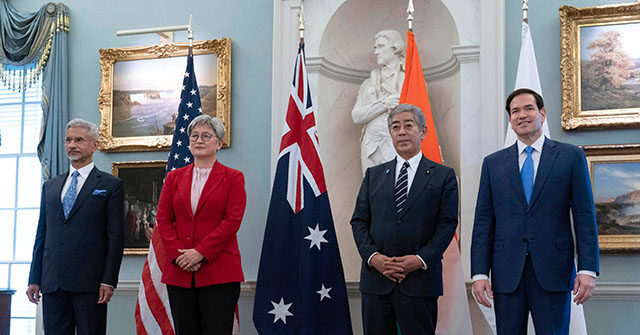Secretary of State Marco Rubio met with the foreign ministers of America’s allies in the Quad – Australia, India, and Japan – on Tuesday to announce a new partnership on critical minerals, intended to reduce the dependence of all four nations on China for their supplies.
Rubio said up to 40 companies from the Quad nations would meet at the State Department on Tuesday to discuss diversifying their mineral supply chains, and other plans for international cooperation.
In addition to the Quad ministerial meeting, Rubio held bilateral meetings with each of the visiting foreign ministers, including Iwaya Takeshi of Japan, Penny Wong of Australia, and Subrahmanyam Jaishankar of India, and they had time for bilateral conversations with each other.
Wong praised the United States as “Australia’s closest ally and principal strategic partner,” and said her meeting with Rubio was focused on “peace and stability in the Indo-Pacific.”
“We agreed that it’s never been more crucial to take concrete actions that support peace, stability and prosperity in the Indo-Pacific,” she said of her Quad partners.
The Quad is formally known as the Quadrilateral Security Dialogue, a four-way strategic forum that began in 2004 after a devastating tsunami in the Indian Ocean led to close cooperation between the member states.
The Quad’s focus shifted from disaster relief to the growing threat from China after the Wuhan coronavirus pandemic. Group meetings after the pandemic have often focused on trade, as the United States has strong economic relations with its three partners, and almost $2 trillion in U.S. trade flows through the Indo-Pacific region.
Jaishankar went on to meet with Defense Secretary Pete Hegseth at the Pentagon after the Quad conference, to talk about defense coordination and arms sales. Hegseth expressed optimism about the completion of “several major pending U.S. defense sales to India.”
The Quad meeting issued a joint statement condemning the April 22 terrorist attack on India. While the statement called on all members of the United Nations to cooperate with “all relevant authorities” to bring justice to the “perpetrators, organizers, and financiers of this reprehensible act,” it did not mention the country India has accused of coddling or colluding with the terrorists, namely Pakistan.
WATCH — President Trump: Joe Biden Let China “Fleece Us” on Trade:
President Donald Trump’s tariffs have clearly caused some friction in the Quad, especially Japan, which does not seem likely to reach a deal with Trump before the waiver he issued on tariffs expires on July 9.
“We’ve dealt with Japan. I’m not sure we’re going to make a deal. I doubt it,” Trump said on Tuesday, suggesting Japan could face even higher tariffs than the 24 percent rate that will take effect on July 9.
One thing all members apparently agree on is the importance of diversifying mineral supply chains away from China, which dominates the industry worldwide, using forced labor and state subsidies to keep its prices down.
“We are deeply concerned about the abrupt constriction and future reliability of key supply chains, specifically for critical minerals. This includes the use of non-market policies and practices for critical minerals, certain derivative products, and mineral processing technology,” the Quad members said in their joint statement, which did not mention China by name.
“Reliance on any one country for processing and refining critical minerals and derivative goods production exposes our industries to economic coercion, price manipulation, and supply chain disruptions, which further harms our economic and national security,” they said.
The joint statement did not give many practical details on the new “Quad Critical Minerals Initiative.” India has been searching for alternative supplies of critical minerals in Africa, while Australia is attempting to build up refining capacity so it can process its own mineral products, instead of selling its ore to Chinese companies.
Chinese state media immediately made light of the enterprise, casting doubt on whether or not the initiative could match China’s low prices for minerals or build anything to challenge the processing capacity China has developed, especially at a time when tariffs are creating friction between the Quad members.
Read the full article here


